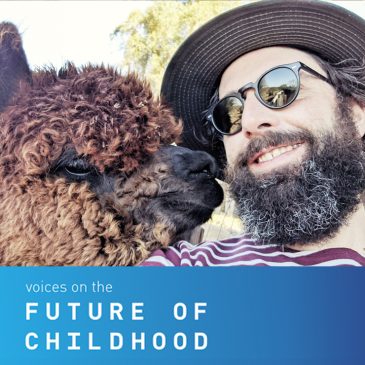For the fourth part of this series, we asked experts to focus their predictions on digital play by answering the question, “How will the way children play with digital media change in the coming months and/or years as a result of the coronavirus pandemic?”
Kids will demand authenticity through digital play
 Jordan Shapiro, PhD, is author of The New Childhood: Raising Kids to Thrive in a Connected World and a Senior Fellow at the Joan Ganz Cooney Center.
Jordan Shapiro, PhD, is author of The New Childhood: Raising Kids to Thrive in a Connected World and a Senior Fellow at the Joan Ganz Cooney Center.
Across all age groups, children report spending more time engaged in digital play during the pandemic. And it’s not just because they’re bored or looking for an escape. It’s because closed schools and social distancing practices have transformed the entire landscape of childhood.
So many of the things that previously made claims on kids’ imaginations, shaped their habits of mind, oriented their aspirations, and constituted their social world have been upended. For instance, they’re no longer preoccupied with ongoing playground games. The everyday drama and anxiety of hallway gossip is gone. And concerns about who hangs with which of the popular kids during the weekend are now irrelevant. To worried parents, many of whom are still nursing traumatic wounds caused by their own pubescent insecurities, this may seem like a relief. But for kids, it can be difficult.
The ability to engage with a unique community in transitional spaces, apart from parents and teachers, is an important element of social-emotional growth. It plays a critical role in the development of an autonomous sense-of-self. It’s where we first explore questions of identity and agency. So, kids have no choice but to figure out how to do it in whatever context they find themselves.
Perhaps this explains why most gamers say that they’ve made new online friends during the pandemic. They’re also playing new games in different genres, and they feel like online communities have been friendlier and more helpful. Currently, the digital world is no longer a supplement to the real world. Instead, it’s the primary landscape of childhood. You can’t put that back in the bottle!
So, expect the next generation to demand more diversity, dignity, and authenticity from digital play. They’ll no longer accept the notion (which most grownups seem to believe) that the online world is a superficial, meaningless distraction from the important stuff. It’s their social reality.
See more posts in this series:
Voices on the Future of Childhood
J. Alison Bryant | Andrew Przybylski | Jesse Schell | Jordan Shapiro
Juan Rubio | Katie Salen Tekinbaş | Mitchel Resnick | Tami Bhaumik

